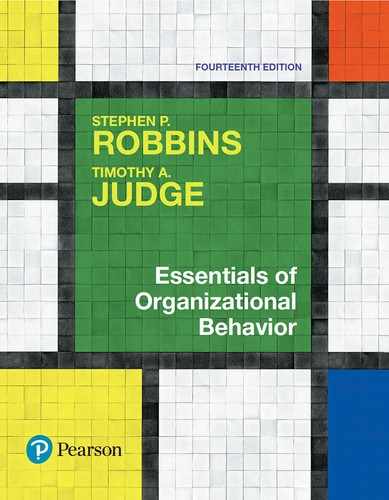 Implications for Managers
by Timothy A. Judge, Stephen P Robbins
Essentials of Organizational Behavior, 14/e
Implications for Managers
by Timothy A. Judge, Stephen P Robbins
Essentials of Organizational Behavior, 14/e
- Essentials of Organizational Behavior
- Brief Contents
- Contents
- Preface
- About the Authors
- Part 1 Understanding Yourself and Others
- 1 What Is Organizational Behavior?
- Improve Your Grade!
- Learning Objectives
- Management and Organizational Behavior
- Complementing Intuition with Systematic Study
- Disciplines That Contribute to the OB Field
- There are Few Absolutes in OB
- Challenges and Opportunities for OB
- Coming Attractions: Developing An OB Model
- Summary
- Implications for Managers
- 2 Diversity in Organizations
- 3 Attitudes and Job Satisfaction
- 4 Emotions and Moods
- 5 Personality and Values
- 1 What Is Organizational Behavior?
- Part 2 Making and Implementing Decisions
- 6 Perception and Individual Decision Making
- Improve Your Grade!
- Learning Objectives
- What is Perception?
- Person Perception: Making Judgments about Others
- The Link Between Perception and Individual Decision Making
- Decision Making in Organizations
- Influences on Decision Making: Individual Differences and Organizational Constraints
- What About Ethics in Decision Making?
- Creativity, Creative Decision Making, and Innovation in Organizations
- Summary
- Implications for Managers
- 7 Motivation Concepts
- Improve Your Grade!
- Learning Objectives
- Motivation
- Early Theories of Motivation
- Contemporary Theories of Motivation
- Other Contemporary Theories of Motivation
- Job Engagement
- Integrating Contemporary Theories of Motivation
- Summary
- Implications for Managers
- 8 Motivation: From Concepts to Applications
- Improve Your Grade!
- Learning Objectives
- Motivating by Job Design: The Job Characteristics Model (JCM)
- Using Job Redesign to Motivate Employees
- Using Alternative Work Arrangements to Motivate Employees
- Using Employee Involvement and Participation (EIP) to Motivate Employees
- Using Extrinsic Rewards to Motivate Employees
- Using Benefits to Motivate Employees
- Using Intrinsic Rewards to Motivate Employees
- Summary
- Implications for Managers
- 6 Perception and Individual Decision Making
- Part 3 Communicating in Groups and Teams
- 9 Foundations of Group Behavior
- Improve Your Grade!
- Learning Objectives
- Groups and Group Identity
- Stages of Group Development
- Group Property 1: Roles
- Group Property 2: Norms
- Group Property 3: Status, and Group Property 4: Size
- Group Property 5: Cohesiveness, and Group Property 6: Diversity
- Group Decision Making
- Summary
- Implications for Managers
- 10 Understanding Work Teams
- Improve Your Grade!
- Learning Objectives
- Why have Teams become so Popular?
- Differences between Groups and Teams
- Types of Teams
- Creating Effective Teams
- Turning Individuals into Team Players
- Beware! Teams Aren’t Always the Answer
- Summary
- Implications for Managers
- 11 Communication
- 9 Foundations of Group Behavior
- Part 4 Negotiating Power and Politics
- 12 Leadership
- Improve Your Grade!
- Learning Objectives
- Trait Theories of Leadership
- Behavioral Theories
- Contingency Theories
- Contemporary Theories of Leadership
- Responsible Leadership
- Positive Leadership
- Challenges to our Understanding of Leadership
- Summary
- Implications for Managers
- 13 Power and Politics
- Improve Your Grade!
- Learning Objectives
- Power and Leadership
- Bases of Power
- Dependence: The Key to Power
- Power Tactics
- How Power Affects People
- Politics: Power in Action
- Causes and Consequences of Political Behavior
- Summary
- Implications for Managers
- 14 Conflict and Negotiation
- Improve Your Grade!
- Learning Objectives
- A Definition of Conflict
- The Conflict Process
- Negotiation
- The Negotiation Process
- Individual Differences in Negotiation Effectiveness
- Negotiating in a Social Context
- Third-Party Negotiations
- Summary
- Implications for Managers
- 12 Leadership
- Part 5 Leading, Understanding, and Transforming the Organization System
- 15 Foundations of Organization Structure
- Improve Your Grade!
- Learning Objectives
- What is Organizational Structure?
- Common Organizational Frameworks and Structures
- Alternate Design Options
- The Leaner Organization: Downsizing
- Why Do Structures Differ?
- Organizational Designs and Employee Behavior
- Summary
- Implications for Managers
- 16 Organizational Culture
- Improve Your Grade!
- Learning Objectives
- What is Organizational Culture?
- What do Cultures do?
- Creating and Sustaining Culture
- How Employees Learn Culture
- Influencing an Organizational Culture
- The Global Context
- Summary
- Implications for Managers
- 17 Organizational Change and Stress Management
- 15 Foundations of Organization Structure
- Epilogue
- Endnotes
- Glossary
- Index
Implications for Managers
Recognize that groups can dramatically affect individual behavior in organizations, to either a positive or negative effect. Therefore, pay special attention to roles, norms, and cohesion—to understand how these are operating within a group is to understand how the group is likely to behave.
To decrease the possibility of deviant workplace activities, ensure that group norms do not support antisocial behavior.
Pay attention to the status aspect of groups. Because lower-status people tend to participate less in group discussions, groups with high-status differences are likely to inhibit input from lower-status members and reduce their potential.
Use larger groups for fact-finding activities and smaller groups for action-taking tasks. With larger groups, provide measures of individual performance.
To increase employee satisfaction, ensure people perceive their job roles accurately.
 Try It!
Try It!
If your professor has assigned this, go to the Assignments section of mymanagementlab.com to complete the Simulation: Group Behavior.
 Personal Inventory Assessments
Personal Inventory Assessments
Communicating Supportively
Are you a supportive person? Take this PIA to find out if you communicate supportively.
9-1. Which of the concepts in this chapter apply to experiences you’ve had in groups?
-
No Comment